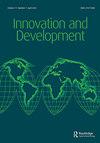中国追赶型国家创新系统与韩国和台湾追赶后的国家创新系统:迂回假说与政策启示的验证
IF 1.7
Q3 DEVELOPMENT STUDIES
引用次数: 3
摘要
摘要本研究探讨了国家创新系统(NIS)与中国、韩国和台湾等后发经济体经济追赶之间的关系。发现当代中国也专注于短周期技术,类似于韩国或台湾在20世纪80年代中期和90年代,具有与成熟的NIS相反的属性。相反,韩国和台湾正在从短周期技术转向以长周期技术为基础的领域,其NIS正在向先进或成熟的NIS靠拢。因此,本研究验证了所谓的“绕路”假设,即一个成功的追赶型经济体可以遵循技术绕路,首先专注于短周期行业,然后才转向更具挑战性或长周期的技术型行业。此外,这种迂回与经济增长绩效之间的联系得到了验证,证实了中国进入短周期技术与经济增长之间的正相关关系,以及韩国和台湾在追赶后阶段或2000年代以来进入长周期技术与经济增长之间的正相关关系。本文章由计算机程序翻译,如有差异,请以英文原文为准。
Catching-up national innovations systems (NIS) in China and post-catching-up NIS in Korea and Taiwan: verifying the detour hypothesis and policy implications
ABSTRACT This study addresses the relationship between national innovation systems (NIS) and economic catch-up by latecomer economies, such as China, South Korea, and Taiwan. Contemporary China is found to also specialize in short cycle technologies, similar to Korea or Taiwan in the mid-1980s and 1990s, featuring opposite attributes from mature NIS. By contrast, Korea and Taiwan are moving away from short-cycle technologies into long cycle technologies-based sectors, and their NIS are becoming similar to those of advanced or mature NIS. Thus, this study verifies the so-called ‘detour’ hypothesis that a successful catching-up economy can follow a technological detour of first specializing in short cycle sectors and only later turning into more challenging or long cycle technology-based sectors. In addition, the linkage from such detour to economic growth performance is verified, confirming a positive relationship between moving into short cycle technologies and economic growth in China, and between going into long cycle technologies and economic growth in Korea and Taiwan for the post-catch-up stages or since the 2000s.
求助全文
通过发布文献求助,成功后即可免费获取论文全文。
去求助
来源期刊

Innovation and Development
Social Sciences-Cultural Studies
CiteScore
3.70
自引率
0.00%
发文量
24
期刊介绍:
conomic development and growth depend as much on social innovations as on technological advances. However, the discourse has often been confined to technological innovations in the industrial sector, with insufficient attention being paid to institutional and organisational change and to the informal sector which in some countries in the South plays a significant role. Innovation and Development is an interdisciplinary journal that adopts a broad approach to the study of innovation, in all sectors of the economy and sections of society, furthering understanding of the multidimensional process of innovation and development. It provides a forum for the discussion of issues pertaining to innovation, development and their interaction, both in the developed and developing world, with the aim of encouraging sustainable and inclusive growth. The journal encourages articles that approach the problem broadly in line with innovation system perspective focusing on the evolutionary and institutional structure of innovation and development. This focus cuts across the disciplines of Economics, Sociology, Political Science, Science and Technology Policy, Geography and Development Practice. In a section entitled Innovation in Practice, the journal includes short reports on innovative experiments with proven development impact with a view to encouraging scholars to undertake systematic inquiries on such experiments. Brief abstracts of degree awarded PhD theses in the broad area of concern for the journal and brief notes which highlight innovative ways of using internet resources and new databases or software are also published.
 求助内容:
求助内容: 应助结果提醒方式:
应助结果提醒方式:


